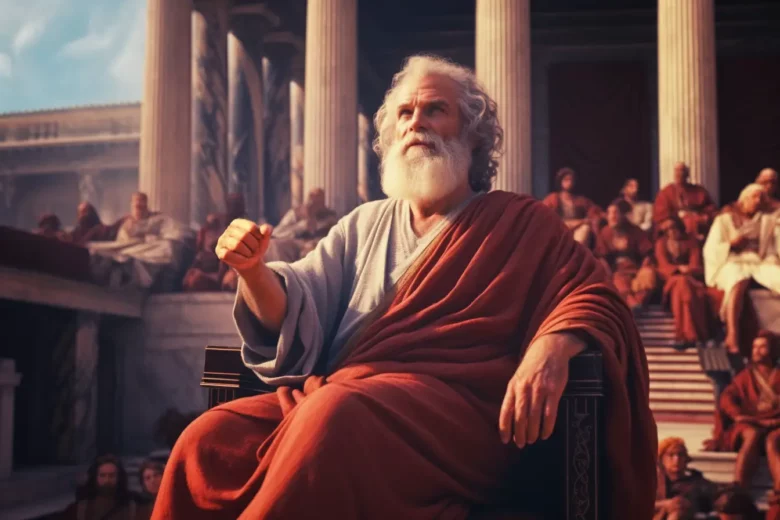In today’s world, where challenges and uncertainties are integral parts of life, the quest for effective leadership and inner strength has become essential. In this article, we will dive into the lives and teachings of the “Great Stoics of History” to discover how Stoicism, an ancient philosophy, played a crucial role in shaping resilient leaders and individuals with great inner strength.
The key phrase that will guide our journey is “Great Stoics of History: Leadership and Inner Strength”. This expression not only honors the notable Stoics who shaped past eras, like Epictetus, Seneca, and Marcus Aurelius, but also highlights the timeless relevance of their philosophical principles for modern leaders and individuals.
At the heart of this article is Stoicism, a philosophy that flourished in the Hellenistic and Roman period, known for its emphasis on virtue, rationality, and the pursuit of inner tranquility, regardless of external circumstances. Stoicism offers a set of guidelines that help us navigate through life’s turbulent waters with calmness and determination.
Our thesis is clear: by understanding the principles of Stoicism and examining the lives of the great Stoics, we can learn valuable lessons about effective leadership, resilience, and how to cultivate an inner strength that allows us to face challenges with courage and dignity.
Join us on this journey in search of ancient wisdom and be inspired by the stories and life philosophies that shaped some of the most influential figures in history and that still have much to offer to all of us in the quest for leadership and inner strength.
What is Stoicism?
Stoicism, a philosophy of life that dates back to ancient Greece and flourished during the Roman Empire, is a unique approach to facing the challenges of human existence. This philosophy, which continues to be a source of inspiration today, offers a set of solid principles that can enhance our understanding of leadership and strengthen our inner strength.
Detailed Explanation of Stoicism as a Philosophy of Life:
Stoicism focuses on the pursuit of virtue, wisdom, and emotional serenity as the path to a fulfilling and meaningful life. Unlike some philosophies that value the pursuit of material pleasures or the incessant quest for external happiness, Stoicism teaches that true happiness lies in our ability to control our reactions and attitudes in the face of circumstances.
Stoics believe that life is filled with events and situations over which we have no direct control. Therefore, the key to a successful life lies in our power of choice and in the way we respond to these circumstances. Instead of worrying about what we cannot control, we should focus our attention on our actions, thoughts, and emotions, which are under our control.
Highlighting the Basic Principles of Stoicism:
The fundamental principles of Stoicism can be summarized in a few essential guidelines:
- Control What is Controllable: Stoics emphasize that we should focus our efforts only on what is within our direct control. This means that we should not overly distress ourselves with external events or outcomes, but rather with our own choices and attitudes.
- Acceptance of Adversities: Rather than resisting or lamenting life’s difficulties, Stoicism encourages us to embrace adversities as opportunities for personal growth. Accepting the inevitable makes us more resilient.
- Practice of Virtue: Virtue is a central concept in Stoicism, including qualities such as courage, justice, wisdom, and self-control. Stoics believe that the pursuit of virtue is the key to moral excellence and true fulfillment.
- Detachment from Passions and Desires: Excessive desire for material goods, fame, or sensory pleasures is seen as a source of suffering. Stoics promote moderation and detachment from these desires to achieve greater emotional tranquility.
Connection between Stoicism and Leadership:
The relationship between Stoicism and leadership is profound. Effective leaders often face challenges, pressures, and adversities in their roles, and Stoic principles offer valuable guidance for dealing with these situations. The ability to remain calm under pressure, make rational decisions, and act with integrity are crucial qualities for leaders, all encouraged by Stoicism.
Moreover, leadership is not just about managing teams or organizations, but also about leading our own lives. Stoic principles help us lead our own journeys, make decisions aligned with our values, and develop the inner strength needed to overcome obstacles.
In the subsequent sections of this article, we will explore how notable figures such as Epictetus, Seneca, and Marcus Aurelius incorporated these principles into their lives and how their experiences can illuminate the path to leadership and inner strength in modern times.
Epictetus – The Philosopher Slave
Epictetus, known as “The Philosopher Slave,” is an inspiring figure in Stoicism who demonstrated, through his life and teachings, how the principles of this philosophy can shape a strong character and a resilient leader.
Life Story of Epictetus and His Path as a Stoic:
Epictetus was born around 55 AD in Hierapolis, Phrygia (now Turkey), in a time when he was a slave. From an early age, he faced significant adversities in his life. However, his quest for knowledge and wisdom led him to study philosophy, especially Stoicism, under the guidance of the Stoic philosopher Geminus.
Despite his status as a slave, Epictetus embraced the principles of Stoicism fervently. He believed that the only thing under his control was his own mind and choices. This understanding empowered him to achieve remarkable inner freedom, even under the most adverse circumstances.
Exemplification of How Epictetus Applied Stoic Principles in His Life:
Epictetus not only studied Stoic teachings but also practiced them deeply. He lived according to the principles of Stoicism, embracing simplicity, moderation, and self-sufficiency. His life was an example of how to apply these principles in difficult situations.
One of the most striking lessons that Epictetus left us was the importance of accepting circumstances. He taught that it is not the situations themselves that cause us suffering, but rather our interpretation of them. By adopting an equanimous view of adversities and maintaining a sense of inner calm, he demonstrated how it is possible to face life’s trials with dignity and strength.
Relevance of Epictetus for Leadership and Inner Strength:
The story of Epictetus has profound relevance for leadership and inner strength. Leaders face constant challenges, and the ability to maintain serenity and wisdom under pressure is an invaluable quality. Epictetus teaches us that, regardless of external circumstances, we can cultivate an inner fortress that allows us to lead with integrity and resilience.
Leadership is ultimately about influencing and inspiring others. Epictetus, through his philosophy and life example, shows us how authenticity, compassion, and wisdom can inspire those around us. His story of overcoming and personal growth also reminds us that true leadership begins with leading ourselves.
In summary, Epictetus, The Philosopher Slave, is an icon of Stoicism whose life and teachings continue to illuminate the path to leadership and inner strength. His story reminds us that no matter where we come from or what challenges we face, we can forge a resilient character and inspire others through virtue and wisdom.
Seneca – The Stoic Politician
Seneca, one of the most prominent Stoics in history, left a lasting legacy as a philosopher, writer, and political leader. His influence on political leadership and his teachings on inner strength are worthy of our attention.
Introduction of Seneca as one of the most famous Stoics in history:
Lucius Annaeus Seneca, known simply as Seneca, lived in the first century AD and is remembered as one of the most influential Stoic philosophers. He not only developed a deep understanding of Stoic principles but also applied them in his life in a remarkable way. Besides his philosophical contributions, Seneca played a prominent role in Roman politics, serving as an advisor and tutor to the young emperor Nero.
Highlight of his influence on political leadership:
Seneca’s influence on political leadership is undeniable. As an advisor to Nero, he sought to guide the young emperor towards a more just and compassionate governance. Seneca advocated the idea that a true leader should act with virtue and responsibility, seeking the common good rather than being swayed by personal interests or political gains.
Seneca also stood out in writing letters and essays that addressed moral and political issues. His works, such as “Letters to Lucilius,” are considered treasures of Stoic philosophy and continue to inspire contemporary leaders and thinkers.
Quotes and examples of Seneca’s teachings on inner strength:
Seneca left a wealth of teachings on inner strength and how to cultivate it. His quotes and examples resonate deeply with those seeking effective leadership and emotional resilience:
– “True happiness is to enjoy the present, without anxious dependence upon the future.”
– “Adversity is the training of the spirit.”
– “Part of the cure is to act with dignity rather than anger.”
– “Wisdom is the only wealth that tyrants cannot expropriate.”
– “He who is not strong in the present cannot be strong in the future.”
These words from Seneca emphasize the importance of wisdom, serenity, and self-discipline as fundamental components of inner strength. He believed that true fortitude lay in maintaining calmness and composure, even in the face of the greatest adversities.
In summary, Seneca, The Stoic Politician, exemplified how Stoic principles can shape political leadership and inspire inner strength. His enduring influence and timeless teachings continue to guide leaders in pursuit of compassionate, virtuous, and resilient leadership.
Marcus Aurelius – The Philosopher Emperor
Marcus Aurelius, also known as “The Philosopher Emperor,” is one of the most notable icons of Stoicism and virtuous leadership. In this section, we will briefly explore his life and reign, examine his famous “Meditations,” and analyze how he demonstrated leadership and inner strength.
Brief Introduction to the Life and Reign of Marcus Aurelius:
Marcus Aurelius was born in 121 AD and became Roman Emperor in 161 AD, serving as the leader of the Roman Empire during one of its most challenging periods. His reign was marked by external conflicts, such as wars and epidemics, as well as internal challenges in governing the vast empire.
What makes Marcus Aurelius so remarkable is that, in addition to being an emperor, he was also a committed Stoic philosopher. He continued to study and practice Stoic teachings throughout his life, seeking wisdom and virtue amidst the pressures of governance.
Examination of Marcus Aurelius’ Writings, such as the “Meditations”:
The “Meditations” of Marcus Aurelius are a collection of personal writings he produced during his reign. In these writings, he deeply reflected on Stoic philosophy and its practical applications. The “Meditations” are an honest and introspective exploration of his pursuit of virtue and how he faced life’s challenges.
In the “Meditations,” Marcus Aurelius shares insights on the importance of living according to reason, accepting what cannot be changed, and seeking inner serenity. He reminds us that true wealth lies in integrity and honesty with oneself.
Exploration of How Marcus Aurelius Demonstrated Leadership and Inner Strength:
Marcus Aurelius is a brilliant example of Stoic leadership. Amidst crises and conflicts, he remained steadfast in his principles and continued to govern with compassion and justice. He believed that a leader should be a servant of the common good and that virtue is the only solid foundation for leadership.
His inner strength was evident in his ability to maintain calmness and serenity in stressful situations. He understood that he could not control all circumstances but could control his own response to them. This ability to maintain composure and ethics in difficult times made him a respected and admired leader.
In summary, Marcus Aurelius, The Philosopher Emperor, teaches us that true leadership goes beyond political and material power. It is rooted in virtue, wisdom, and the ability to maintain inner strength in the face of adversity. His writings in the “Meditations” continue to inspire leaders and individuals seeking conscious leadership and a virtuous life.
How to Apply Stoic Principles in Modern Leadership
Stoic philosophy, with its emphasis on virtue, rationality, and emotional serenity, offers a valuable guide for contemporary leaders seeking to excel in leadership and develop unwavering inner strength. In this section, we will discuss how the teachings of the Stoics can be applied in modern leadership, providing examples from real-world situations and practical tips for developing leadership skills based on Stoicism.
Discussion on how Stoic teachings can be applied by contemporary leaders:
- Self-Knowledge: Stoics emphasize the importance of knowing oneself. Modern leaders can start with an honest self-assessment of their strengths and weaknesses, beliefs, and values. This aids in making decisions aligned with their principles.
- Acceptance of Adversities: In a constantly changing world, leaders face continuous challenges. Stoic teachings encourage accepting these adversities as opportunities for growth and learning.
- Emotional Control: The ability to remain calm under pressure is an essential quality for leaders. Practicing emotional self-discipline and avoiding impulsive reactions can enhance decision-making.
- Ethics in Leadership: Stoics advocated ethics as the foundation of leadership. Modern leaders can draw inspiration from this principle, prioritizing honesty, justice, and integrity in their actions.
Examples of real-world situations where Stoic philosophy is relevant:
- Business Crises: In times of crisis, Stoic leaders can maintain calmness, make rational decisions, and inspire their teams to face challenges with resilience.
- Interpersonal Conflicts: The ability to practice empathy and resolve conflicts compassionately can improve the workplace environment and strengthen professional relationships.
- Deadline Pressure:Leaders facing tight deadlines can benefit from Stoicism by maintaining focus on the necessary actions instead of worrying about the outcome.
Practical tips for developing inner strength and Stoicism-based leadership:
- Reading and Study: Reading works by Stoic philosophers like Epictetus, Seneca, and Marcus Aurelius can deepen understanding of Stoic principles.
- Meditation and Reflection: Setting aside time for daily meditation and reflection can help cultivate inner serenity.
- Practice of Self-Discipline: Setting realistic goals and applying self-discipline to achieve them is key to personal development and effective leadership.
- Pursuit of Virtue: Leaders can strive to act in accordance with Stoic virtues, such as courage, wisdom, and justice, in their decisions and actions.
In summary, Stoic philosophy offers a practical and timeless approach to modern leadership. By applying the teachings of the Stoics, leaders can develop solid inner strength, make wiser decisions, and inspire those around them to achieve their best selves.
Footnote
For the creation of this article, various sources and bibliographic references were consulted that enriched the research on Stoicism and its relationship with leadership and inner strength. Below, we list some of the key sources that contributed to the development of this content:
- Irvine, William B. (2008). “A Guide to the Good Life: The Ancient Art of Stoic Joy”. Oxford University Press.
- Hadot, Pierre (1998). “The Inner Citadel: The Meditations of Marcus Aurelius”. Harvard University Press.
- Robertson, Donald (2019). “How to Think Like a Roman Emperor: The Stoic Philosophy of Marcus Aurelius”. St. Martin’s Publishing Group.
- Epictetus. “Enchiridion” (The Handbook of Epictetus).
- Seneca. “Letters to Lucilius” (Letters to Lucilius).
- Marcus Aurelius. “Meditations” (Meditations).
These sources served as the basis for the research and construction of this article, offering an in-depth understanding of Stoicism and how its principles can be applied in leadership and the development of inner strength. We recommend reading these works for a more detailed exploration of Stoicism and its practical implications.



